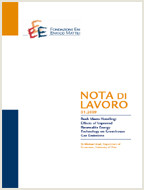Regulating the Environmental Consequences of Preferences for Social Status within an Evolutionary Framework

Date
24.04.2015
24.04.2015
Authors
Eftichios S. Sartzetakis (University of Macedonia – Department of Economics); Anastasios Xepapadeas (Athens University of Economics and Business, Beijer Fellow); Athanasios Yannacopoulos (Athens University of Economics and Business)
JEL Code
Q53, Q58, D62, D82
Q53, Q58, D62, D82
Keywords:
Status-seaking, Replicator Dynamics, Information Provision, Environmental Taxation
Status-seaking, Replicator Dynamics, Information Provision, Environmental Taxation
Publisher
Climate Change and Sustainable Development
Climate Change and Sustainable Development
Editor
Carlo Carraro
Carlo Carraro
Taking as given that we are consuming too much and that overconsumption leads to environmental degradation, the present paper examines the regulator’s choices between informative advertisement and consumption taxation. We model overconsumption by considering individuals that care about social status apart from the intrinsic utility, derived from direct consumption. We assume that there also exist individuals that care only about their own private consumption and we examine the evolution of preferences through time by allowing individuals to alter their behavior as a result of a learning process, akin to a replicator dynamics type. We consider the regulator’s choice of consumption taxation and informative advertisement both in an arbitrary and an optimal control context. In the arbitrary overconsumption control context we find that the regulator could decrease, or even eliminate, the share of status seekers in the population. In the context of optimal overconsumption control, we show that the highest welfare is attained when status seekers are completely eliminated, while the lowest in the case that the entire population consists of status seekers.
***
Sartzetakis, E. S., A. Xepapadeas, A. Yannacopoulos, (2015), ‘Regulating the Environmental Consequences of Preferences for Social Status within an Evolutionary Framework’, Nota di Lavoro 34.2015, Milan, Italy: Fondazione Eni Enrico Mattei
